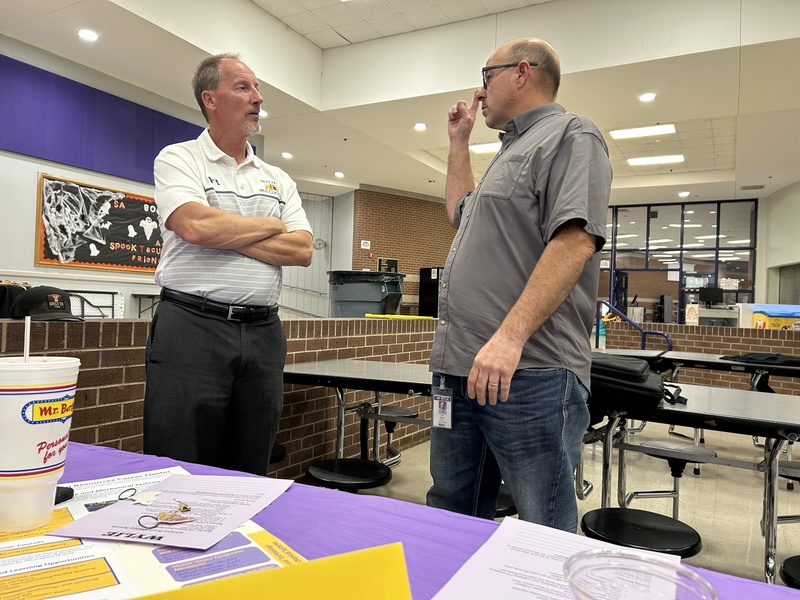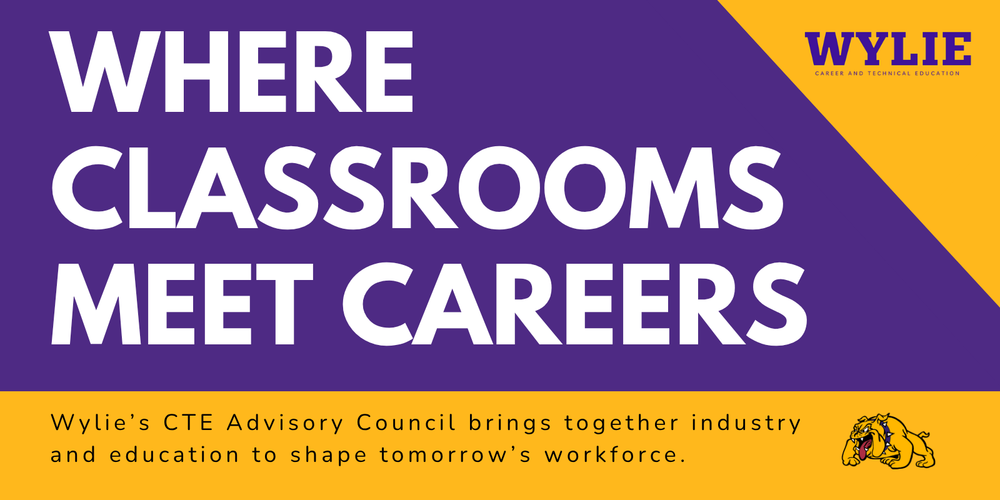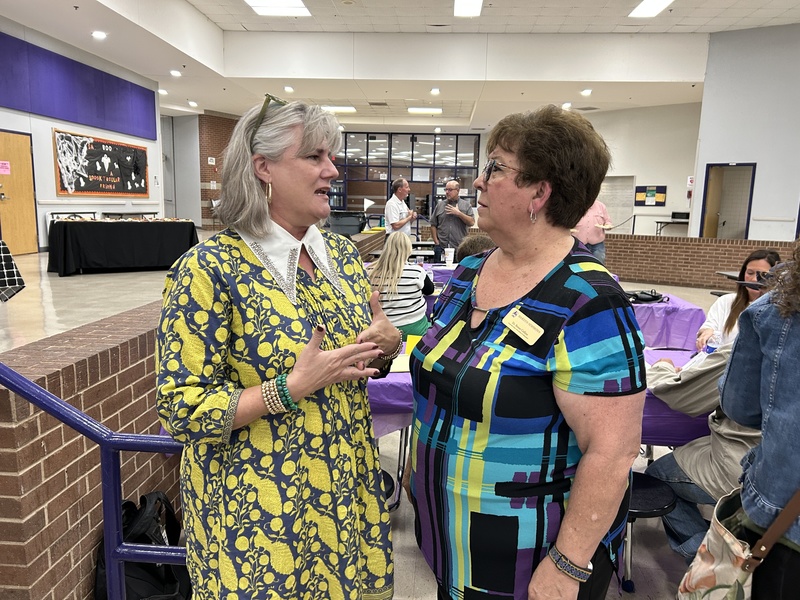CTE Advisory Council kicks off with partners, purpose, and a delicious assist from Culinary Arts
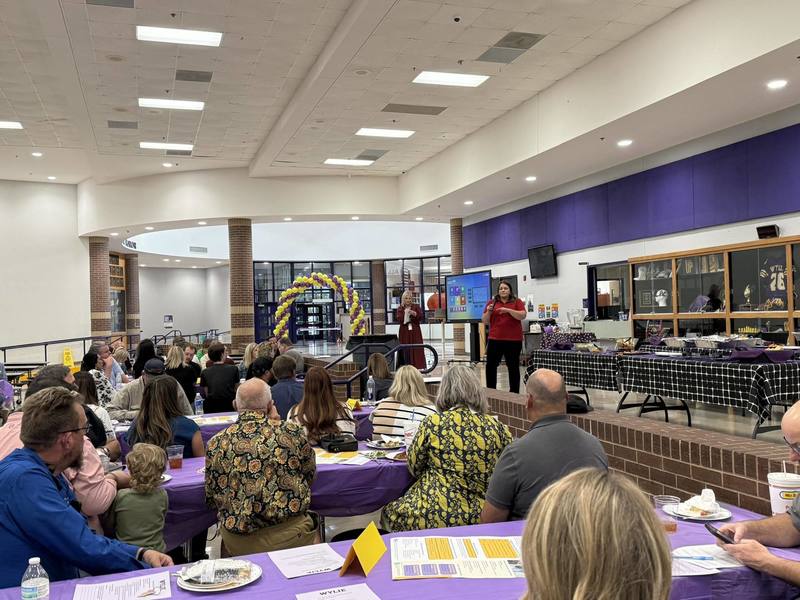
It wasn’t your typical Thursday night on the Wylie High campus. Inside the library, tables were filled with school board members, industry professionals, teachers, parents, and student leaders—all sharing a meal and a mission. The first Wylie High Career and Technical Education (CTE) Advisory Council meeting of the year brought together more than 60 guests representing 21 programs of study, and the energy in the room made one thing clear: the future of Bulldog Nation is bright.
The night began with gratitude — fittingly paired with an incredible dinner prepared by Wylie’s Culinary Arts students, led by Laura Nelson, Sarah Blakely, and Katie Peacock. Their students turned out a restaurant-worthy meal that earned a round of applause before the first agenda item even began.
Principal Reagan Berry and CTE Coordinator Amy Fecci opened the meeting by thanking the teachers and community partners who make Wylie’s CTE programs thrive. “Our students are exploring real career opportunities early in life so they can make informed decisions about what comes next,” Fecci said. “We’re building pathways that fit their skills, passions, and goals — not someone else’s expectations.”
From agriculture to graphic design, from audio production to health science, each program of study at Wylie High is built around the same goal: preparing students for success beyond graduation. And this year’s advisory council reflected that diversity. Local business owners, college partners, and workforce leaders spent the evening offering insight, advice, and encouragement to ensure every course stays relevant to real-world needs.
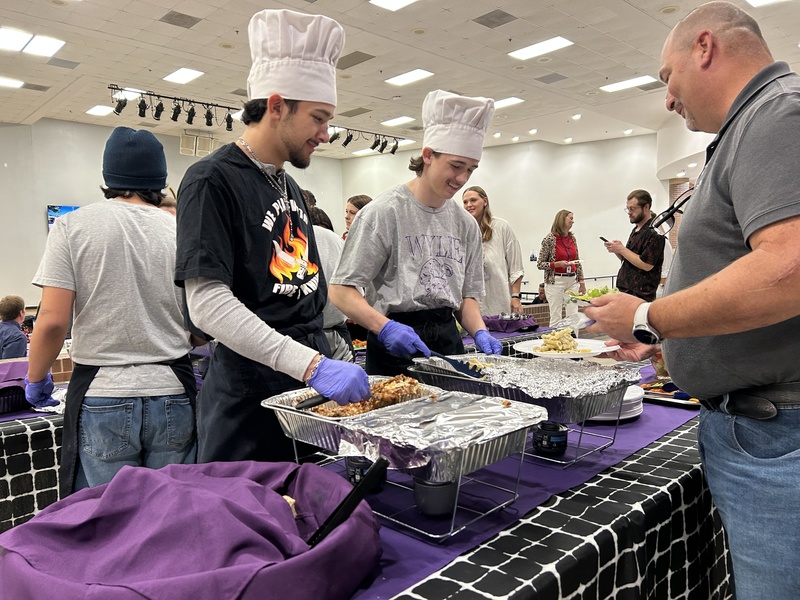
A Community Effort
Lindsey from the Development Corporation of Abilene (DCOA) shared how Wylie’s CTE programs are shaping the future of the local economy. Through initiatives like NEXTU, DCOA is connecting education to economic development in tangible ways — from providing industrial maintenance equipment to supporting hands-on learning experiences. “CTE is that first step,” she said. “It’s that ticket to an entry-level job in the industries that are growing right here in Abilene.”
She listed major local employers like Primal Pet Foods, Broadwind, and Hartmann, who are eager to hire students with strong technical and problem-solving skills. “Every week, I’m asked how to fill these jobs with CTE students,” she added. “Wylie’s involvement makes my job easier — you’re building the future workforce of Abilene.”
That sentiment was echoed by Workforce Solutions of West Central Texas, who partner with Wylie to provide job training, industry tours, and internships. This year alone, 13 Wylie students are completing paid healthcare internships with Hendrick Medical Center, working in departments like the ER and patient care. Last year, 28 students took part in similar opportunities across the region. “We see students learning skills they’ll use for the rest of their lives,” Workforce Solutions representative Aimee Allen shared. “These experiences open doors that classroom lessons alone can’t.”
The Heart Behind the Programs
Teachers and business partners worked together throughout the evening, reviewing Wylie’s course offerings, certifications, and equipment needs. The discussion touched on everything from the rise of programming and digital infrastructure jobs to the importance of soft skills like communication and teamwork.
Board members joined in, too. One noted how the district’s recent bond program—a $275 million investment in facilities—includes major CTE expansions already visible across the district. From the new Agricultural Science building nearing completion to the upcoming CTE wing at Wylie High, the district is doubling down on opportunities that prepare students for life after graduation. “If you haven’t seen what’s coming,” one board member said with a grin, “you’re going to be blown away.”
Even between discussions, you could feel the sense of pride. Teachers beamed as they heard business partners talk about hiring CTE grads. Students stood to be recognized for pursuing pathways in fields like engineering, marketing, and digital design. And throughout it all, the recurring theme was collaboration—how schools, families, and the business community can work hand-in-hand to give every student a meaningful future.
As the evening wrapped up, Fecci encouraged everyone to stay connected beyond the meeting. “These conversations don’t have to stop here,” she said. “Email, collaborate, share ideas. We’re building something special together.”
And as guests gathered their things and thanked the culinary students one last time, it was clear that something bigger than a meeting had taken place—it was a snapshot of a district and a community fully invested in its young people.
